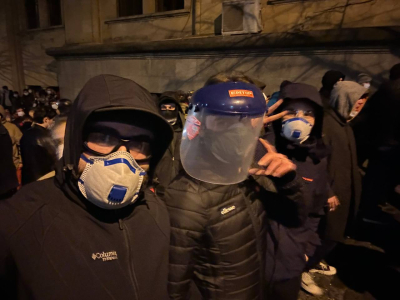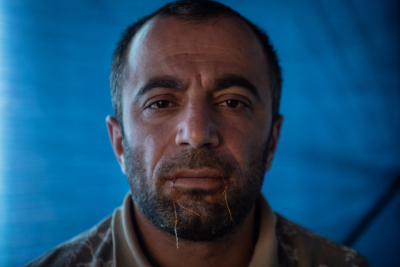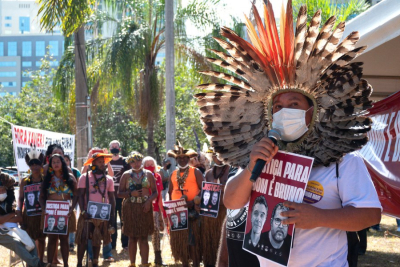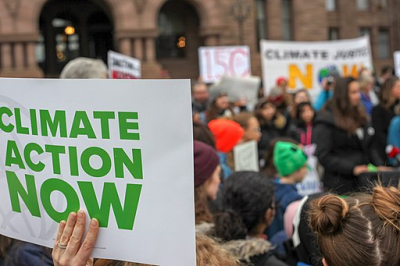Critics argue that the law is a tool to silence dissent and weaken democracy ahead of the critical October 2024 parliamentary elections, jeopardizing Georgia's European integration and further entrenching the ruling party’s grip on power.
Politics under Russian influence
Georgian Dream was established by, and is still in control of, the richest man in Georgia, Bidzina Ivanishvili. Ivanishvili got rich during privatization in the 1990s in Russia and his wealth is estimated to exceed Georgia’s state budget (as of 2021). Since he entered into politics in 2012, his rhetoric has increasingly shifted towards anti-Western positions, particularly following Russia's invasion of Ukraine, marking a departure from the early pro-European stances. The European Parliament issued a resolution recommending sanctions be imposed on Ivanishvili due to his business and personal ties with the Kremlin. More recent resolution also mentions sanctioning Ivanishvili for "his role in the deterioration of the political process in Georgia."
Corruption, links to Russia, worsening freedom of media and rule of law all complicated country’s aims for European integration. The Foreign Agents Law was just the last straw which fully exposed the authoritarian tendencies of the ruling elite. Zviad Tsetskhladze, one of the lead organisers in a student protest group, has described the law as a “breakdown of democracy” as it “embodies larger issues for protesters, such as corruption among the governing elites and a political shift away from the EU, to which Georgia gained candidacy status in December.”
According to Eka Gigauri, the executive director of Transparency International said that the law “is just a symptom; this is about Russian influence, hybrid war, a generational fight”.
After initial withdrawal of the proposed law in March 2023, it was adopted by the Georgian Parliament first on 14 May 2024, and ultimately on 28 May 2024, overruling the presidential veto.
What is the “Foreign Agents” Law?
The “Foreign Agents” Law requires NGOs and media outlets, which receive more than 20 % of their annual funding from abroad, to be registered as “agents of foreign influence.” The law also grants vast monitoring powers over all NGOs and media for the Ministry of Justice. The law requires non-profit organizations to fully disclose their finances and additional information in the register. If they do not provide the information requested, they will be fined 5,000 GEL (more than 1,500 euro), which could be repeated every month.
The NGOs and media are obliged to sign up for registration themselves. If they refuse to do so, the state will impose a fine of 25,000 GEL (around 8,500 euro) and will register the NGO itself. Furthermore, failure to provide financial declaration will lead to another 10,000 GEL. A non-complying organization can be subject to further fines, including an additional monthly fine of 20,000 GEL.
Georgian lawyers have quantified that an NGO which will refuse to comply with repressive rules can be in total penalized by 55,000 GEL (around 18,600 euro) in just two months, with the possibility of adding 20,000 GEL every month. For many organizations, that would be fatal.
In the country where more than 90 % funding of NGOs is from abroad, such penalties are absolutely devastating and only highlight repressive intentions behind the adoption of the law.
Apart from that, the law grants the authorities power to request sensitive personal data. Many sensitive information and documents submitted to the authorities shall be publicly available. As the Ministry of Justice clarified at the Constitutional Court hearing, not all the documents will be publicly available, but they will be accessible to the ministry. In particular, information included in the financial declarations shall be public, but the ministry can access any other documents if it deems necessary to ascertain the accuracy of the information provided in the declarations.
From August 2, NGOs and media organizations are obliged to register in the registry. They had one month to do so until September 2. The Ministry of Justice has one month to study the documentation, and it is in this process that it is empowered to request personal information, including special category data. Among them are racial and ethnic affiliation of an individual, sex life, political opinion, religious, philosophical or other beliefs, as well as biometric and genetic data.
These rules do not apply for organizations established by the state and explicitly for National Sports Federation of Georgia, which illustrates the true purpose of the law – to stigmatize and oppress certain NGOs and media critical of the government.
Domestic resistance: fundamental freedoms under attack
In a joint statement of April 2024, NGOs and media have strongly opposed the proposal, as more than 250 of them refused to cooperate with the government till the proposal is repealed, declared they will refuse to participate in “any defaming registers” and urged the society to participate in anti-government protests. Even after the law entered into force, NGOs declare that “nobody will obey” the law and that they are ready to pay the fines, if necessary.
The proposal of the law was accompanied by personal attacks and government propaganda against the most visible figures of civil society. Among them Eka Gigauri, executive director of Transparency International. Anonymous posters accusing her and other civil society figures of being enriched by foreign money appeared, allegedly orchestrated by the government. Georgian branch of Transparency International is one the NGOs who has refused to comply if the law is adopted.
“This is the matter of dignity for us. We are the patriots of this country. We were serving this country for many years and the people of this country. And we are not going to put on ourselves the sign of ‘agent’ or ‘spy’ who was undermining the state's interest,” said Eka Gigauri.
The discussion of the law in the Parliament has motivated the largest protests in the country since its fight for independence in 1991. Protests in front of the Georgian Parliament started in March 2023 and were met with harsh response of the police: tens of demonstrators were arrested, including an opposition leader, who was reportedly beaten. After two days of violently dispersed protests, the government decided to withdraw the law. Since reintroduction of the bill in April 2024, protests continued for three months in the streets of Tbilisi.
Tens of thousands of protesters periodically blocked streets of the capital, with record gatherings in mid-May with estimated 200-300 thousands of participants. Rallies were held in Batumi, Kutaisi and other Georgian cities. Crowds were brutally suppressed by police by rubber bullets, tear gas, water cannons, beatings and other tools of repression. Journalists and opposition politicians were both targets of police attacks. Several people were injured by the bullets.
Authoritarian tendencies of the Georgian government are not shown only by the law itself, but also in the persecutions of the peaceful protests. The Georgian Young Lawyers’ Association (GYLA) presents a long list of abuse of power in its report (see original in Georgian).
GYLA has recorded multiple instances of physical violence by law enforcement against the opponents of the Foreign Agents Law. Authorities have disproportionately restricted freedom of assembly by unjustified dispersals of peaceful protests, often using violent means. In April and May 2024, around 200 people were detained with the right to freedom and right to a fair trial being violated.
Both administrative and criminal proceedings were misused by the authorities to discourage and intimidate protesters. Eight individuals were arrested for alleged criminal charges related to the protest. Opponents of the law, their family members and journalists were threatened with physical harm by telephone calls from various foreign numbers, allegedly orchestrated by the government.
Online newspaper Civil Georgia provides chronicle of repression of 2024 protests.
International response
The Foreign Agents Law has been since its proposal also under scrutiny of international community. Human Rights Watch has called the government to abandon the proposal, mentioning that the law could also negatively affect trade unions and workers’ rights.
The Venice Commission, advisory body of the Council of Europe for rule of law, has issued an “urgent opinion”, “strongly recommending” to repeal the law (Venice Commission, p. 24). It found out, that restrictions set in the Foreign Agents Law are contrary to freedom of expression, freedom of association, right to privacy, right to participate in public affairs and prohibition of discrimination, which are enshrined in European Convention of Human Rights and other international documents. The law would “adversely affect open, informed public debate, pluralism and democracy.” The Venice Commission concludes that the law stigmatizes NGOs and the media risking their silencing and potential elimination (Venice commission, p. 23-24).
The Commission expressed concerns not only about the content of the law, but also regarding the process of its adoption. The law was adopted in the final (third) hearing just five weeks after its submission to Parliament and there was no meaningful consultation process with the stakeholders affected (Venice Commission, p. 12). The Committee head was repeatedly turning off the microphone of the opponents and expelling them from the hall during the hearings. The third hearing of the committee to vote for the bill lasted only 67 seconds.
Adoption of the law was “deeply regretted” by the EU institutions and officials (in a statement by the High Representative of the EU joined by the European Commission). Enactment of the law goes against the core European values and is going against three out of nine key recommendations set by the European Commission for Georgia as a candidate for the EU membership. Georgia’s EU path remains highly uncertain, as EU accession process for Georgia was “de facto” halted by the European Council on 27 June 2024. Suspension of the process because of the “current democratic backsliding” was reconfirmed by the resolution of the European Parliament.
Looking ahead
The “Russian Law” came into force on June 4, only months prior to general election, which will take place in October 2024, and its fast adoption could have been motivated to gain control over critical NGOs and media ahead of the vote.
The law is challenged before the Constitutional Court and European Court of Human Rights (ECHR). The constitutional lawsuit was filed by the President, 121 civil society and media organizations, two journalists and 38 opposition MPs. On 4 October 2024, the Court decided to admit the complaints for substantial review. However, it has rejected the motion for the interim measure to suspend the application of the law. Three judges dissented.
“The court had a historic chance to oppose the suspension of the European integration process, to prevent the government from accessing confidential information of citizens, and to stand by its people, who for months, despite government violence, steadfastly defied Russian Law. Unfortunately, the Constitutional Court could not make an independent decision as it again came under the ruling party's influence and failed to fulfill the function assigned to it - protection of the Constitution,” expressed Georgian NGOs in a joint statement.
Legal battle against the “Russian law” will continue in Strasbourg, as 120 civil society organizations, 16 media organizations and four natural persons have on October 17 2024 appealed the law to the ECHR arguing violation of five key articles of the European Convention on Human Rights.
Sadly, newly adopted law is one among dozens worldwide. Russian example was followed by India, Israel, Hungary and Kyrgyzstan. Proposals are debated for example in Serbia, Bosnia and Herzegovina (Venice Commission, p. 10) or Slovakia. Russian law has been proven to be an effective instrument of repression: a third of all NGOs in Russia closed in the first two years that the 2012 law on foreign agents was enacted. As authoritarianism rises in the region, other governments are adopting similar measures, a worrying trend that should not be underestimated.
On 1st October 2024, the first organizations were added to the registry. As of September 2, deadline of the mandatory registration at the Ministry of Justice, only 476 of the organizations operating in Georgia applied for registration (while there are several thousands, as clarified by the Ministry at the hearing before the Constitutional Court).
However, there is still a chance to reverse attempts to attack essential freedoms. The fate of the law and Georgian democracy will be determined by the result of the decisive parliamentary election on 26th October 2024. Regardless of the outcome, one thing is clear: the Georgian civil society will not give up easily.
Sources:
ENG 21/8/2024 What Georgia’s Foreign Agent Law Means for Its Democracy (cfr.org)
ENG 01/12/2022 Russia: New Restrictions for ‘Foreign Agents’ (Human Rights Watch)
ENG 30/05/2024 Georgian NGOs to challenge foreign agent law in constitutional court, ECHR (Reuters)
ENG 28/05/2024 Georgia’s EU dream in tatters as ‘foreign agent’ bill becomes law (politico.eu)
ENG 25/04/2024 The non-governmental and media organizations suspend cooperation formats with the government until the Russian Law is dropped (csf.ge)
ENG 29/05/2024 Hundreds of Georgian NGOs pledge to defy ‘foreign influence’ law (Al Jazeera)
GE 25/04/2024 Public and media organizations are suspending cooperation with the authorities until the Russian law is passed (csf.ge)
ENG 13/06/2024 Georgia's NGOs refuse to comply with 'Russian' foreign agent law (voanews.com)
ENG 28/05/2024 Statement by the High Representative with the European Commission on the final adoption of the law on transparency of foreign influence in Georgia (European Commission)
ENG 16/05/2024 Bidzina Ivanishvili: Georgia’s billionaire ‘puppet master’ betting the house on Moscow (The Guardian)
ENG 08/03/2024 Georgia protests: Thousands on street for second day over 'foreign agent' bill (BBC)
ENG 27/04/2022 Russian Businesses of Bidzina Ivanishvili and His Relatives (Transparency International Georgia)
ENG 10/26/2024 EU parliament votes to consider sanctioning Georgia’s informal leader (eurasianet.org)
ENG 21/08/2024 Giorgi Gakharia: "Georgian Dream" is synonymous with corruption and nepotism - We will recover every lari stolen from the budget from those gentlemen (globalnews.ge)
ENG 12/05/2024 Tbilisi hosts the largest protest in Georgia's modern history (tvpworld.com)
ENG 03/05/2024 'Rubber Bullets And Beatings': Victims, Eyewitnesses Talk Of Violence Against Georgian Protesters (RFE/RL)
ENG 01/07/2024 Angered by Georgia’s ‘foreign agent’ law, young protesters try new tactic (Al Jazeera)
ENG 05/06/2024 Live Blog: ‘Yes to Europe, No to Russian Law’ – Rallies Against Foreign Agents Bill (Civil Georgia)
ENG 01/10/2024 First Georgian NGOs Added To 'Foreign Agents' Registry Under Controversial Law (RFE/RL)
ENG 12/04/2024 Georgia: Abandon ‘Foreign Agent’ Registration Law (Human Rights Watch)
ENG 21/05/2024 URGENT OPINION ON THE LAW ON TRANSPARENCY OF FOREIGN INFLUENCE (Venice Commission)
GE 10/06/2024 Georgia: human rights Amidst of Russian law (GYLA.ge)
ENG 10/06/2024 Georgian Young Lawyers' Association has prepared a special report: "Georgia: human rights Amidst of Russian law" (GYLA.ge)
ENG 03/06/2024 Georgian opposition plan coalition as ‘foreign agent’ law adopted (Al Jazeera)
ENG 22/05/2024 Georgia’s new law on “transparency of foreign influence” and its incompatibility with international human rights standards (The Foreign Policy Centre)
ENG 25/11/2024 Laws against “foreign agents”: the multi-functional tool of authoritarian regimes (International Federation for Human Rights)
ENG 18/01/2022 India Should Stop Using Abusive Foreign Funding Law (Human Rights Watch)
ENG 18/07/2016 Israeli Knesset approves controversial law targeting foreign-government funding for NGOs (International Federation for Human Rights)
ENG 13/12/2023 Hungary passes contested laws against foreign influence (euractiv.com)
ENG 03/04/2024 Slovakia pushes for new law on NGOs, critics fear Hungary-like restrictions (euractiv.com)
ENG 21/10/2024 Georgia at a crossroads: October 2024 parliamentary elections (Briefing of the European Commission)
ENG 27/09/2024 2024 | Chronicle of Repression (Civil Georgia)
ENG 09/10/2024 Parliament says Georgia’s democracy is at risk (European Parliament)
EN 11/05/2024 Orchestrated Intimidation of Protesters Against Agents’ Bill (Civil Georgia)
GE 15/04/2024 Okhanashvili turns off the microphone of the MPs when the Russian law is mentioned in the parliament (https://batumelebi.netgazeti.ge/)
GE 29/04/2024 The 8th deputy, Levan Khabeishvili, was also expelled from the discussion of the "Russian Law". (netgazeti.ge)
GE 13/05/2024 "Dream" as "hope" of the President's veto - should the "law of agents" be changed or fail? (https://www.radiotavisupleba.ge/)
ENG The European Union and Georgia (eeas.europa.eu)
ENG 30/08/2024 Constitutional Court Hearing on Foreign Agents Law (Civil Georgia)
ENG 09/10/2024 Constitutional Court Rejects Suspension of Agents’ Law (Civil Georgia)
GE 04/10/2024 The President of Georgia, Members of the Parliament of Georgia: Tamar Kordzaia, Ana Natsvlishvili, Levan Bezashvili and others (38 members), NNLE "The Institute for Development of Freedom of Information", NNLE "Rights Georgia", NNLE "Civil Society Foundation" and others (122 complainants), LTD "Network of Information Centers", NNLE "Studio Monitor" v. The Parliament of Georgia (Constitutional Court of Georgia)
ENG 09/10/2024 The Constitutional Court of Georgia did not fulfill its duty (Social Justice Center)
ENG 17/10/2024 Legal battle against the “Russian law” to continue in Strasbourg (Transparency International Georgia)
GE 01/10/2024 "We are not under anyone's influence" - the first five appeared in the "Foreign Agents" register (https://www.radiotavisupleba.ge/)
GE 17/05/2024 According to the changes in the Russian law, monitoring and fines will also apply to individuals (netgazeti.ge)





